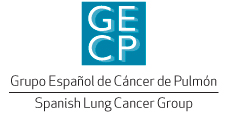The methods used to diagnose lung cancer focus on imaging techniques (chest x-ray, CT scan or MRI) and the analysis of samples of tissues and cells, known as biopsies.
PERSONALISED THERAPY
How Lung Cancer is diagnosed?
What is the treatment?
The choice of treatment depends on the diagnosis of each patient and stage of the disease. A multidisciplinary team of oncologists, pulmonologists, surgeons, radiologists, pathologists and radiotherapists will decide the most suitable protocol on a case-by-case basis. This will establish the surgery, radiotherapy, chemotherapy or targeted therapies to take place, based on the needs of the patient.
Tailored therapies: the future of the fight against lung cancer
Several milestones have taken place in research and the treatment of lung cancer over the last two decades. The discovery of mutations, specifically in the EGFR gene in a subgroup of patients and their possible treatment with biological drugs, has opened the possibilities for tailored chemotherapy.
These drugs act by blocking the mechanisms that favour cell development and growth by blocking tumour development. These substances are more specific and less toxic.
The Spanish Lung Cancer Group’s research has demonstrated that this type of patients can double its surviva rates through oral therapy, compared to traditional chemotherapy.
Tailored treatment is therefore the way forward to treat the disease, depending on the genetic mutations presented by each patient. And these mutations are in reality “biological targets” that allow oncologists to predict which treatment will be most effective in certain types of patients. This type of therapy enables the patient to better respond to chemotherapy, improving his or her survival and quality of life.
The hospital sites should offer their patients genetic alteration studies (either through the sending of samples to a reference hospital or performing these studies if available at their own sites) and, if genetic changes are confirmed, to facilitate a specific treatments on the basis of this mutation.


